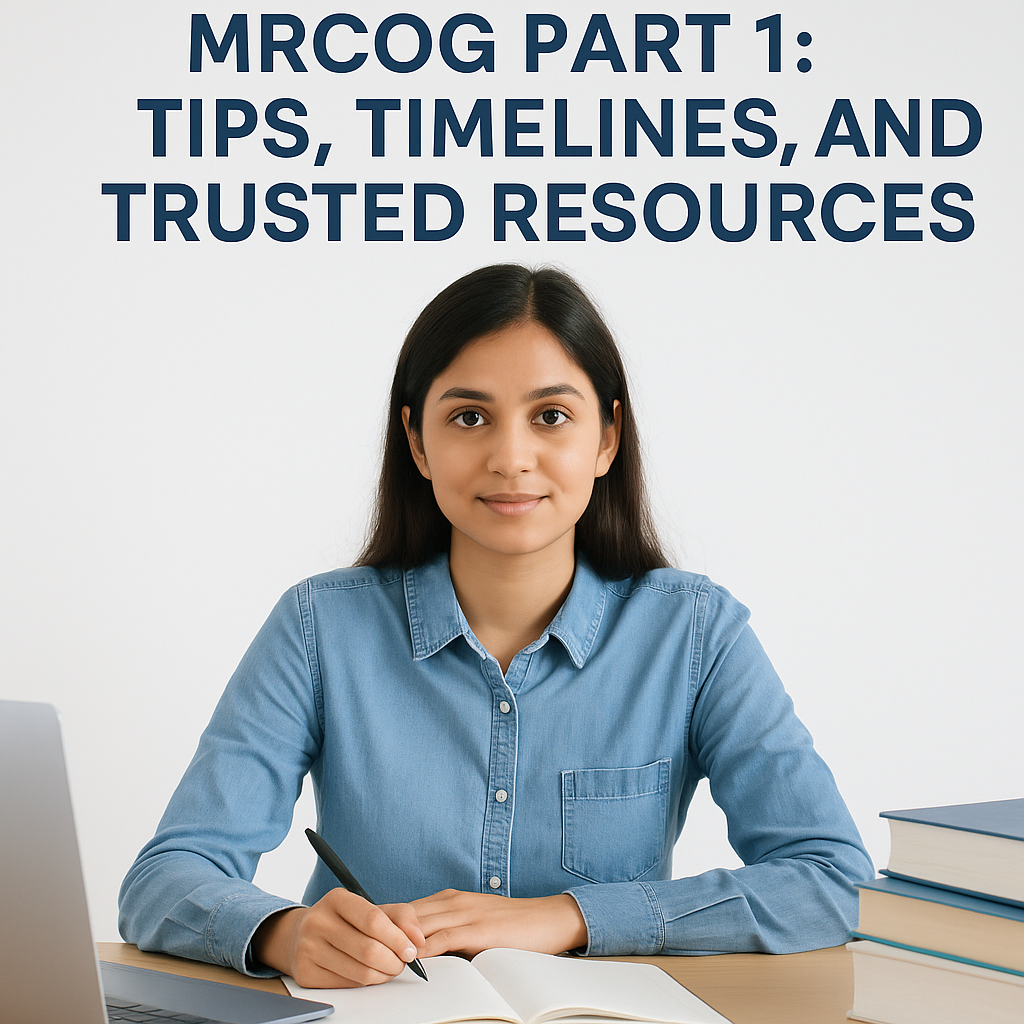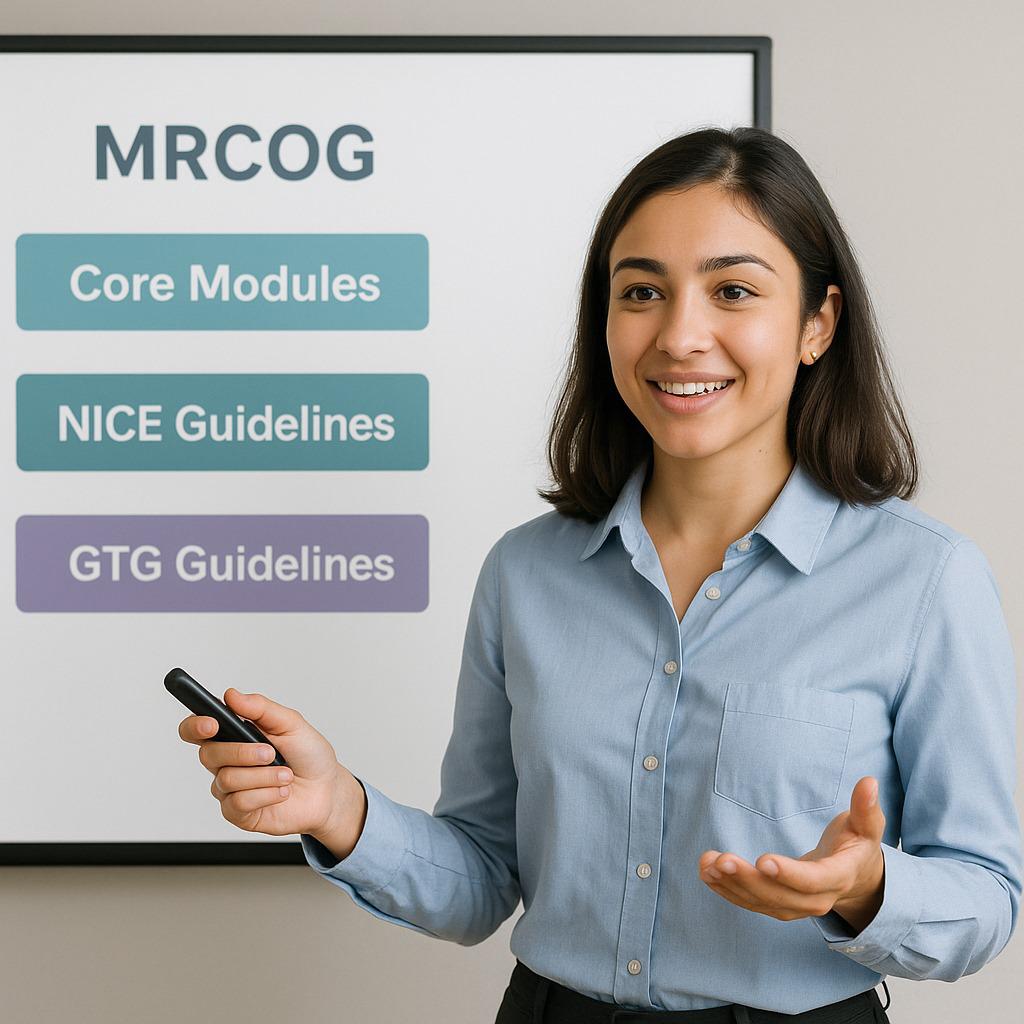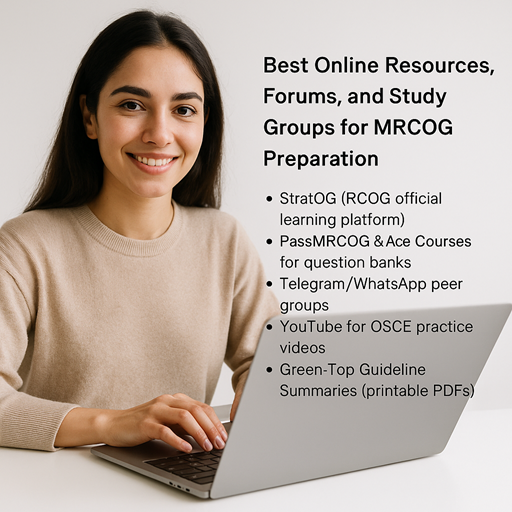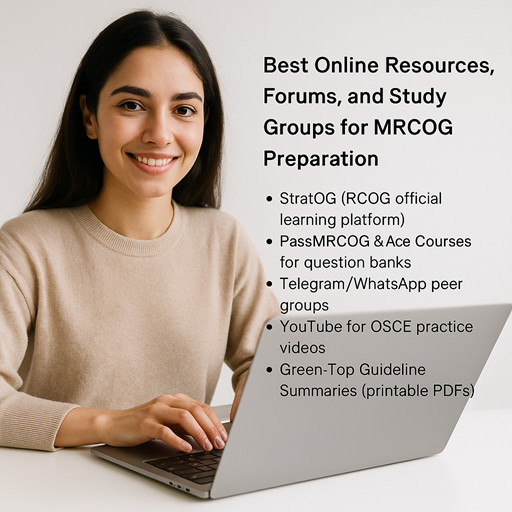2025-04-23 | Category: Mrcog 2

📘 How to Prepare for
MRCOG Part 1: Tips, Timelines, and Trusted Resources
The MRCOG Part 1 examination is the first step in
becoming a Member of the Royal College of Obstetricians and Gynaecologists. It
assesses the basic and applied sciences essential to the understanding
of clinical practice in obstetrics and gynaecology. While foundational, it is
also rigorous and demands consistent study and strategy.
This guide provides an in-depth roadmap on how to
prepare effectively, with tips, timelines, and the best resources to maximize
your success.
🧠 What Does MRCOG Part 1
Cover?
The exam evaluates your understanding of basic sciences,
including:
- Anatomy
- Physiology
- Pharmacology
- Embryology
- Biochemistry
- Genetics
- Pathology
- Microbiology
- Endocrinology
- Statistics
and Clinical Epidemiology
The emphasis is on clinical relevance, not just
theory. You are expected to apply your scientific knowledge to problem-solving
within obstetrics and gynaecology.
📝 Exam Format at a Glance
- Two
written papers, both taken on the same day:
- 📄
Paper 1: Single Best Answer (SBA) questions – 100 questions, 2.5
hours
- 📄
Paper 2: SBA questions – 100 questions, 2.5 hours
- All
questions are SBA format (no EMQs), each testing applied knowledge
and reasoning
📅 Suggested 6-Month Study
Timeline
|
Month |
Focus Areas |
|
1–2 |
Core sciences (anatomy, physiology, pharmacology); create
foundation notes |
|
3–4 |
Embryology, genetics, biochemistry, pathology, stats |
|
5 |
Integrate learning with mock exams, reinforce weak areas |
|
6 |
Intensive revision, timed SBA sets, review flashcards and
notes |
🔄 Review high-yield
topics every 2–3 weeks to maintain memory retention.
🎯 Top Study Tips
✅ 1. Structure Your Time with
Weekly Goals
- Break
down the RCOG syllabus into weekly study chunks
- Allocate
dedicated time for practice questions and content review
🗓️ Example weekly plan:
- Mon–Wed:
Read and annotate core topics
- Thu–Fri:
Practice 50 SBAs with feedback
- Sat–Sun:
Review notes + mock test (alternate weekends)
✅ 2. Master Core Resources
|
Resource |
Why Use It |
|
📘 Basic Sciences for
Obstetrics and Gynaecology by Tim Chard |
Excellent core text; concise and well-structured |
|
📙 EMQs in Obstetrics
and Gynaecology |
Additional clinical reasoning and early exposure to
scenario-based learning |
|
🖥️ Pastest |
Large SBA bank with timed options |
|
🖥️ PassMedicine
(MRCOG Part 1 edition) |
Topic-wise questions with high exam relevance |
|
📘 RCOG Core
Curriculum |
Blueprint of what's examined |
|
🧠 Mind the Bleep
(Free) |
Great for stats, anatomy, and embryology |
|
🧪 BMJ OnExamination |
Another trusted MCQ platform with analytics |
✅ 3. Practice, Practice, Practice
- Aim
for at least 3,000–4,000 questions over your prep period
- Do timed
blocks (50 SBAs in 60 minutes) to simulate real exam pressure
- Always
review explanations, even for correct answers
✅ 4. Leverage Mnemonics and
Visual Aids
- Use
apps like Anki or Quizlet for flashcards
- Diagrams,
flowcharts, and tables can simplify complex subjects (e.g., fetal
circulation, pelvic anatomy)
Example:
- Mnemonic
for TORCH infections: Toxoplasmosis, Other (syphilis), Rubella,
CMV, Herpes
✅ 5. Join Study Communities
- Connect
with others via:
- Telegram
groups
- Facebook
MRCOG prep groups
- Reddit
forums (r/ObGyn, r/medicalschool)
Benefits:
- Peer
motivation
- Clarifying
difficult concepts
- Getting
recent exam recalls and updates
✅ 6. Take Mock Exams Every 4
Weeks
- Full-length
mocks improve:
- Time
management
- Stamina
- Test-taking
strategy
Track scores and use them to shape your revision:
- <
60%: Review content gaps
- 60–75%:
Strengthen weak topics
- 75%:
Focus on refining technique
❌ Common Pitfalls to Avoid
- ❌
Cramming: MRCOG Part 1 needs long-term consolidation
- ❌
Skipping SBA practice: Familiarity with question logic is critical
- ❌
Over-reliance on reading: Active recall is far more effective than
passive study
- ❌
Ignoring stats and anatomy: These are heavily tested and often
overlooked
📥 Resources from MRCOG
PASS EXAMINATIONS
We offer:
- ✅
Study planners and topic-wise revision sheets
- ✅
GTG + SBA-based flashcards
- ✅
Weekly quizzes and mock drills
- ✅
Peer-led support groups
- ✅
“Ask a Mentor” drop-in clinics
🔗 Join our free Telegram
community or explore full prep packages at passexaminations.com
💡 Final Words
MRCOG Part 1 is your gateway to specialist training.
Think of it as building your clinical compass—every question you solve helps
shape your future practice. With consistent effort, structured planning, and
the right resources, you can crack this exam confidently.
📣 Believe in the
process, and let every day of study move you one step closer to MRCOG success!



